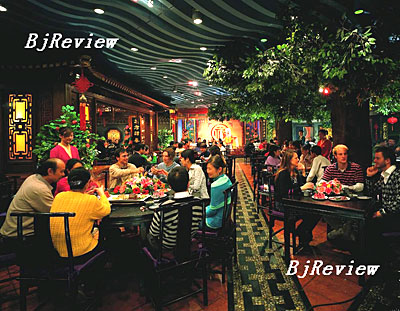|

On the dinning table of Chinese families, the family banquet on the eve of lunar New Year is supposed to be the tastiest and the longest dinner as well as the highlight of the celebration of the Spring Festival.
At this precious family reunion the whole family is supposed to chat over the dinner into the new year. This dinner also requires particularly elegant table manners. Parents usually tell their children from a very young age that spirits of the dead family members will have this one dinner together with them and will not want to see any misbehavior.
When the chimes of bells at midnight usher in the new year, children usually kowtow to their grandparents and receive "luck money" in red packets before rushing to the courtyard to light fire crackers.
A family New Year's Eve menu contains both the favorite dishes of family members and food special to the occasion bearing symbolic blessings to the family. Good housewives are required to cook seasonal food with the best ingredients in the family kitchen to bless the family with longevity, prosperity, high status, joy and numerous offspring.
Chinese dumplings are the pearl in the crown in the banquet table on New Year's Eve in most parts of China. Since the shape of Chinese dumplings is similar to ancient Chinese gold or silver ingots, they symbolize wealth. Coins are hidden in the dumplings eaten on New Year's Eve. A person who finds a coin will have a good fortune in the new year.
Fish is an absolute must on the New Year's Eve table, largely because it sounds similar to the word "surplus" in Chinese. The eating of fish represents the hope that the following year will be one of abundance. The type of fish and the manner in which it is cooked vary in different parts of the country.
A whole chicken is also often thought a necessary part of the meal since rooster is considered an auspicious animal. The concept of family unity can be read into the dish of meatballs or tangyuan, a dessert made out of rice flour and any kind of sweet stuffing, simply because they are round.
Preparing all of this food entails a good deal of cooking. While in old times housewives could start the elaborate preparations months ahead, few families in urban centers have time to make such preparations. As a new tradition, celebrating New Year Eve in a restaurant has swept Chinese cities in recent years, families that want to celebrate the Spring Festival in traditional style without the hassle of cooking by themselves have to place their orders at least one month ahead to guarantee a spot at their ideal restaurants.
Urban families that like the homely atmosphere on that special night but are too preoccupied to cook a traditional banquet either hire a professional chef to cook at home or buy pre-cooked banquet dish packages sold in supermarkets, which require only heating and slicing to become a delicious dish.
These new demands of urban families have created a new nationwide catering business around the lunar New Year's Eve. According to a survey by the Ministry of Commerce in 18 big cities in China, during the Spring Festival of 2007, over 600,000 restaurant tables were booked on New Year's Eve while over 8 million food packages for family banquets were sold, which added up to total sales of nearly 10 billion yuan ($1.4 billion). According to the survey, all big and medium-sized restaurants were booked out for the celebration; in fact the popularity of this dinner has forced many restaurants to handle oversubscriptions by committing one table to two to three families at different time.
New year in a mansion
Dazhaimen is a lavish restaurant chain with six outlets in Beijing. Using the elaborate decorations of ornamental wood, brick and stone carvings from Chinese ancient architecture and real antique furniture, Dazhaimeng, literally "the gate of a mansion," intends to create an interior décor simulating that of a distinguished family in a dynastic era.
| 